You’re chowing down on hash browns at home when your furry friend comes in the room and gives you those puppy eyes. But you wonder: can dogs eat hash browns?
We did some digging to find out the answer to this question, and here’s what we found. Hash browns may be a breakfast staple for you, but they can be dangerous for dogs.
The main ingredient in hash browns is a potato, so let’s answer the first question;
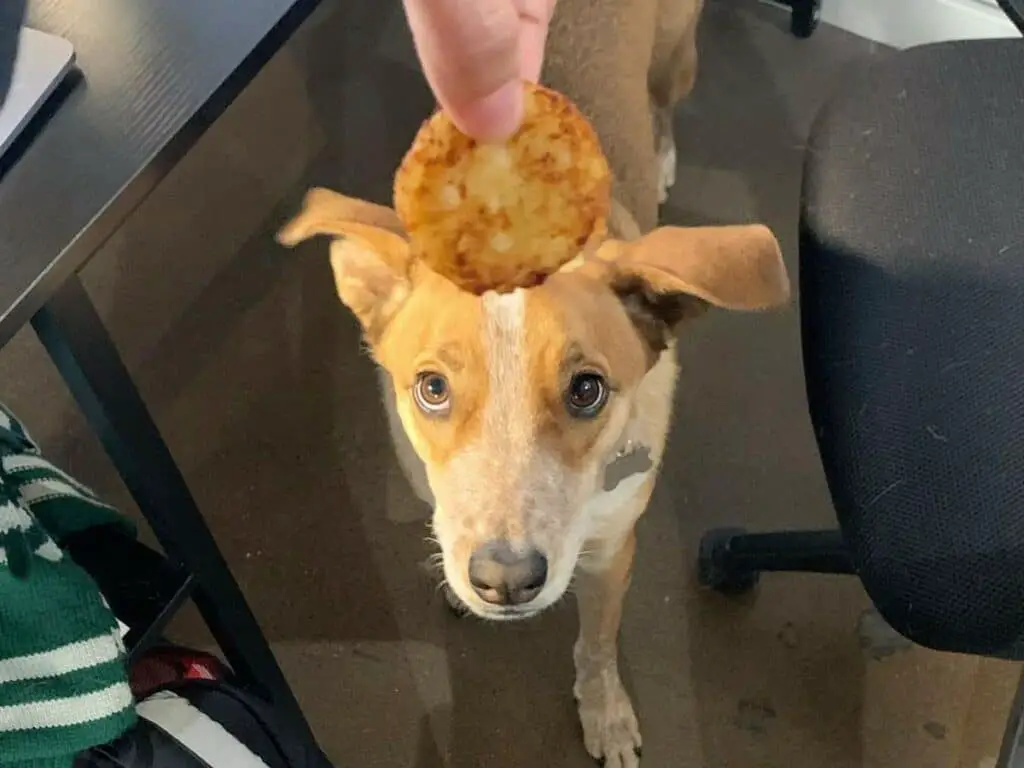
Can Dogs Even Eat Potatoes?
Can dogs eat potatoes? It’s a debated question, with some dog owners swearing about the benefits of feeding their pups potatoes and others insisting it’s a big no-no. So what’s the verdict?
It is a common question among dog owners whether potatoes are safe for their pets. The answer to this inquiry depends on the type of potato and its preparation.
The humble potato is packed with vitamins and minerals, including potassium, iron, vitamin B6 and vitamin C. Plus, it offers benefits for your pup’s immune system and metabolism.
However, potatoes have high levels of carbohydrates, which means they are also high in calories. Feeding your pooch large amounts of potatoes or anything else with too many calories can lead them to gain weight.
There are plenty of healthier food options for dogs, like green vegetables. These options have fewer calories and no potential toxins.
But what if your dog eats a potato raw? Like all things raw, there’s a risk of getting an upset stomach.
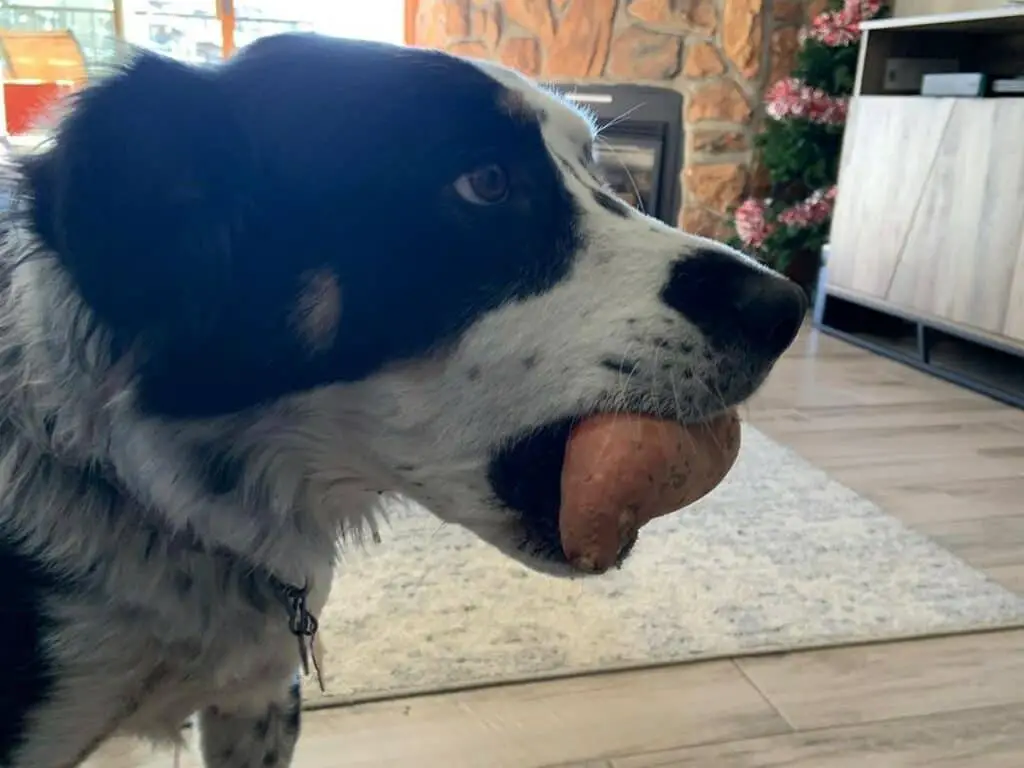
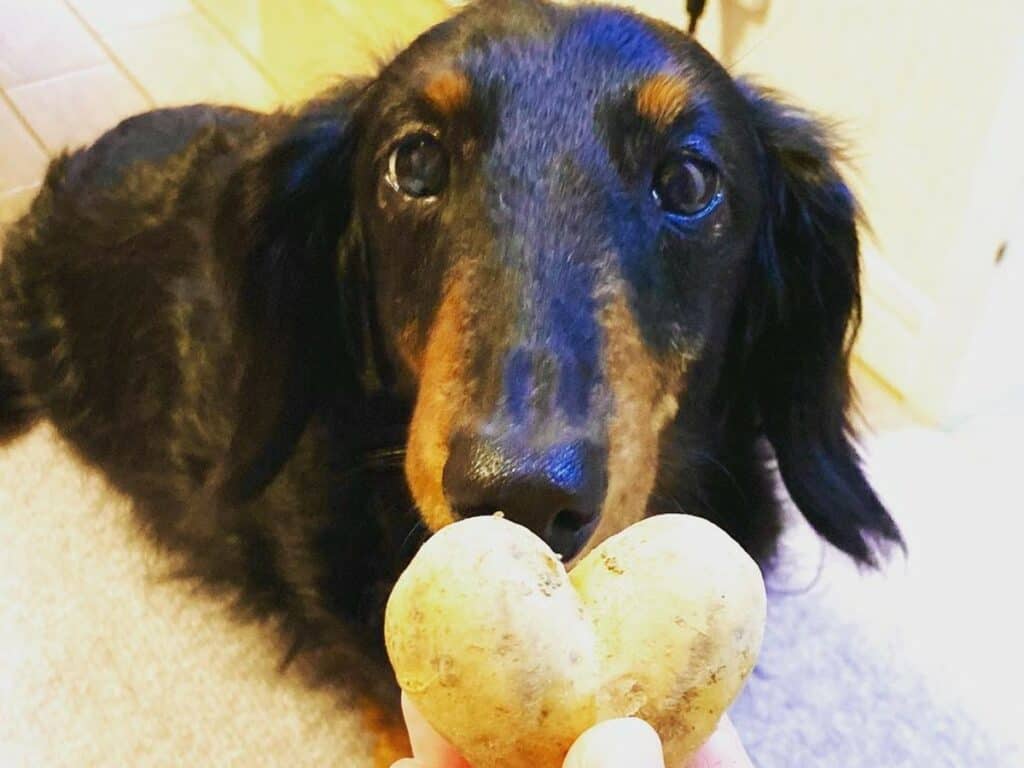
Do your dog a favor and skip the raw sweet potatoes. Both sweet and white potatoes can cause intestinal blockages in dogs when eaten raw.
Cooked Potatoes For Dogs
The adverse health effects of feeding raw potatoes to dogs can be mitigated through cooking. For example, cooking white potatoes will remove the potential for harmful toxins and organisms, making them a much safer option for your dog to consume.
That’s right, don’t let your dog near those raw white potatoes — they belong to the nightshade family and contain a poisonous compound called solanine.
When it comes to feeding your furry friend cooked potatoes, moderation is key. But how you cook them is also vital — stick to baking, steaming, or boiling them with no added extras (e.g. seasonings, sauce, butter, and salt).
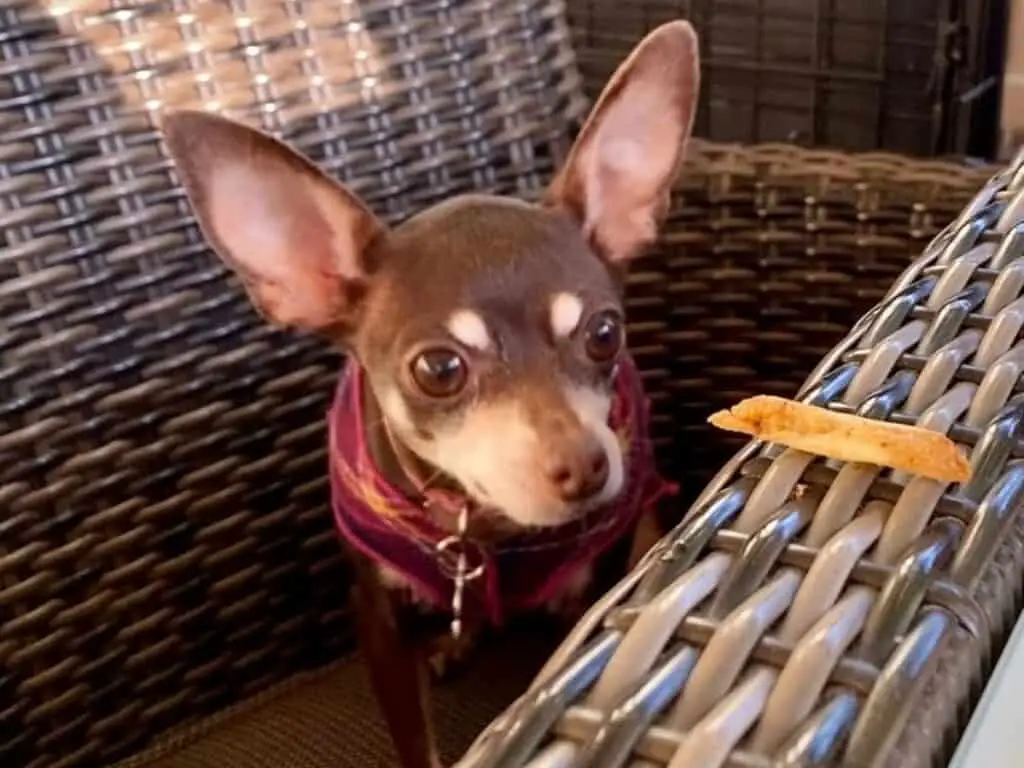
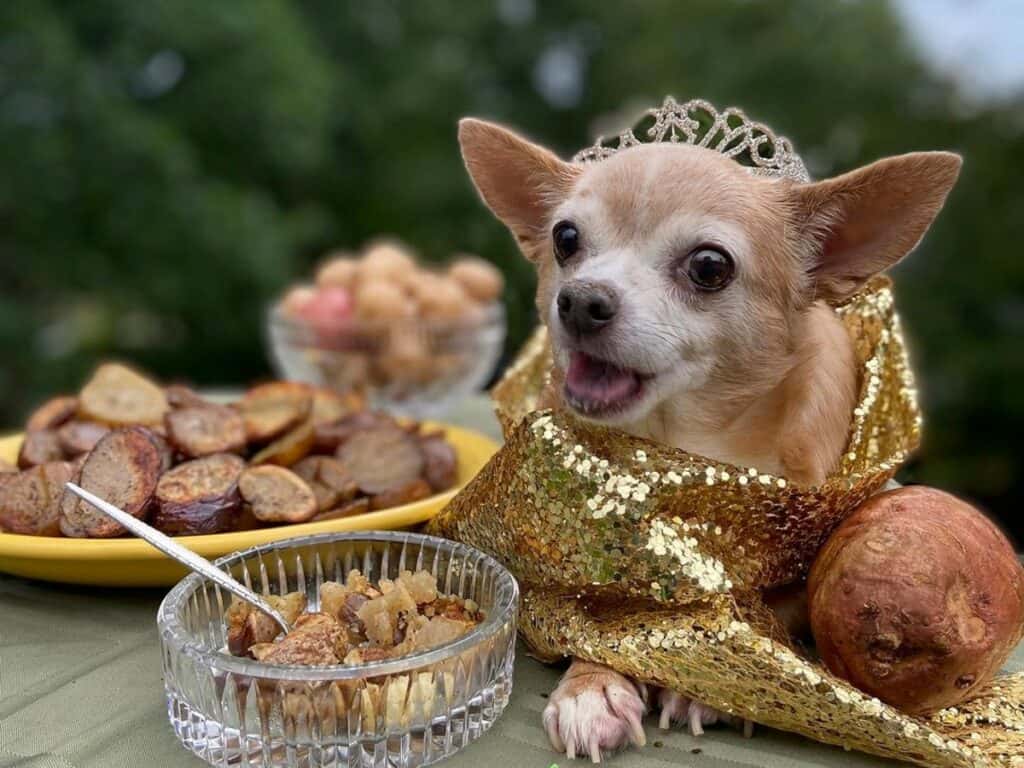
And as tempting as it may be to share your greasy french fries or chips with your pup, it’s best to avoid giving them any fried potatoes, which are not nutritious for dogs and are high in fat. Overweight dogs are at a greater risk of developing diabetes than humans. A diet high in fat is often to blame for such ailments.
Additionally, sweet potatoes that have been cooked offer dogs vital nutrients, including iron, magnesium, calcium, and vitamins A, B6, and C. There’s also a lower glycemic index in sweet potatoes than in white potatoes, thereby not causing your dog to experience the sugar high that often comes with eating white potatoes.
Green Potato Skins For Dogs
Potatoes with greenish skin have high levels of solanine.
While many believe cooking a green potato will lower solanine levels, this is not the case. Green-skinned potatoes are harmful to both humans and dogs. Those who have eaten the green tuber experience symptoms that make them feel like they’re going to puke, have a nasty case of the runs, and have a throbbing headache.
So, what are the best methods for ensuring that potato skins do not turn green? Keep those potatoes in the dark — too much light will make their skins turn green.
Remember that when it comes to potatoes, you don’t want your dogs to go for the green ones.
What are Hash Browns?
Hash browns that are homemade are generally considered healthier than frozen ones bought from a store or fast food restaurant. But this doesn’t take away the fact that hash browns, being a fried food, contain some level of fat, unhealthy sodium, and more.
Lots of fat: Hash browns are packed with unhealthy oils and fats. These fats and oils are what make hash browns so unhealthy for dogs. They can contribute to weight gain, chronic inflammation, and heart disease in dogs.
High quantities of salt: Salt can be a big issue regarding hash browns. This classic breakfast item is loaded with high quantities of salt, causing salt poisoning, dehydration, and stomach upset in dogs. Additionally, hash browns are high in calories and carbohydrates. If you’re not aware, overindulging in carbs can make dogs obese.
Toxic ingredients: Many dog owners don’t know that some of hash browns’ ingredients are toxic to our four-legged friends, such as onion and garlic. Onions can cause gastrointestinal problems, such as vomiting and diarrhea. Garlic can also cause stomach upset, as well as other digestive disorders.
What’s more, the preservatives in frozen hash brown patties can be harmful to your dog’s health.
Solanine: Solanine is responsible for the toxicity of raw potatoes. If your dog eats a large amount of hash browns, he can become sick. Symptoms of toxicity can include vomiting, trembling, headache, heart problems, etc. If left untreated, solanine poisoning can cause paralysis in dogs.
Can Dogs Have Hash Browns?
So can dogs eat hash browns? If your pup is giving you those big, sad eyes and begging for that hash brown loaded with ketchup off your plate, don’t give in.
Even as an occasional treat, hash browns are highly discouraged. They contain high levels of salt, saturated fats, and carbohydrates, which can negatively impact a dog’s body if consumed in large quantities. For example, salt contains high sodium levels and can harm your dog’s kidneys and heart. Saturated fats can block your dog’s arteries, and carbohydrates can raise your dog’s blood sugar.
These unhealthy ingredients compromise your dog’s health and fail to provide the essential nutrients they need. As a result, your dog is likely to consume more unhealthy food in an attempt to satisfy her nutritional needs.
So rather than feeding your dog hash browns as an occasional treat, provide her with a healthy alternative such as a piece of fruit or nutritious dog food.
What Happens If Your Dog Eats Hash Browns?
Your pup is probably just as big of a fan of hash browns as you are. Perhaps unsurprisingly, this is because it’s hard to resist the sight of those salty, crispy potatoes. But unfortunately, they’re not the healthiest choice for our furry friends.
Dogs love to sneak in a bite of hash browns (or any food they’re not supposed to have). Luckily, they will likely be okay after just one little taste.
However, if your pup has finished a plate of hash browns, it might be time to call your vet.
Related Questions
Can dogs eat instant mashed potatoes?
Think again if you’re thinking about giving your pup some instant mashed potatoes! These spuds contain ingredients that can be harmful to young pups. So what’s the big deal with instant mashed potatoes anyway?
Instant mashed potatoes usually include milk. If your dog is lactose-intolerant, instant mashed potatoes can cause serious digestive issues.
In addition, those instant mashed potatoes are loaded with salt. And they often contain extra ingredients that aren’t dog-friendly, such as garlic and chives.
Can dogs eat frozen hash browns?
Dogs shouldn’t eat frozen hash browns, even if they’ve fewer calories than McDonald’s. They also have a lot of salt in them.
Can dogs eat homemade hash browns?
If you made your hash browns with fresh ingredients, unfortunately, the core ingredients (salt, onion, fried potatoes) would still not be suitable for feeding your dog.
References
Mattheeuws, D., Rottiers, R., Kaneko, J. J., & Vermeulen, A. (1984). Diabetes mellitus in dogs: relationship of obesity to glucose tolerance and insulin response. American Journal of Veterinary Research, 45(1), 98-103.
Clipsham, R. (2012). Brunfelsia australis (yesterday, today, and tomorrow tree) and Solanum poisoning in a dog. Journal of the American Animal Hospital Association, 48(2), 139-144.
Thengchaisri, N., Theerapun, W., Kaewmokul, S., & Sastravaha, A. (2014). Abdominal obesity is associated with heart disease in dogs. BMC Veterinary Research, 10(1), 1-7.




